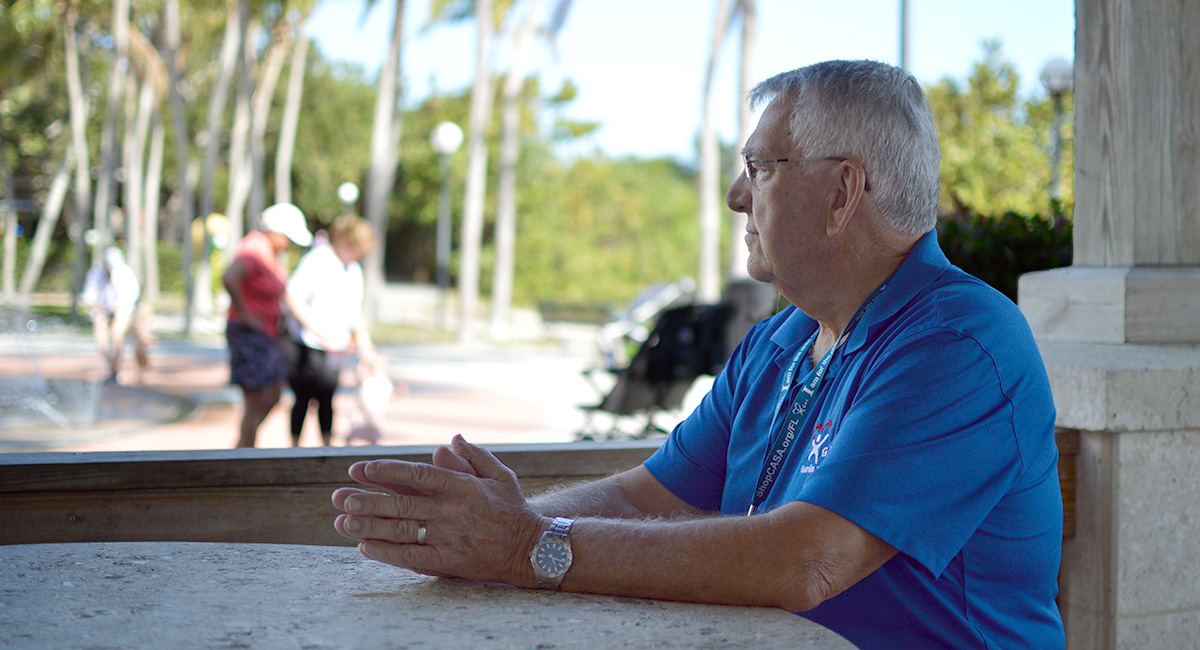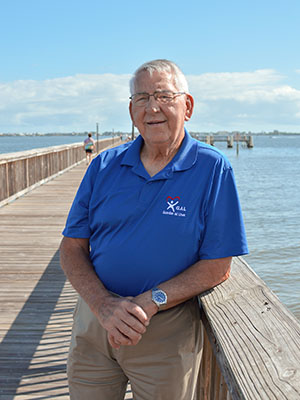Champions for the children

Volunteers for state program watch over young ones in family custody cases
BY WENDY DWYER

Gary Tenpas says he has the best volunteer job ever. The Port St. Lucie resident is a guardian ad litem [GAL] volunteer. Being a GAL allows Tenpas to help children whose parents or guardians have lost custody through difficult circumstances. He also works with families toward reunification and the modern-day equivalent of happily ever after. It’s not an easy gig, but Tenpas says it’s the most rewarding one he’s ever had and he’s been volunteering and giving back throughout his life.
A guardian ad litem volunteer is assigned when the state has custody of a child. GAL volunteers visit their assigned child regularly to understand their circumstances, wishes and needs, and help explain the process so children can understand.
They often advocate on behalf of the children they’ve been assigned, and because they know the children involved, GALs like Tenpas often speak in court on behalf of the children to help the judge make decisions based on what is in the child’s best interests.
“We represent abused, abandoned, and neglected children in the courtroom and the community,” explains Melissa Bujeda, director of communications for the Statewide Guardian ad Litem Office in Tallahassee. “Through the collaboration of a multidisciplinary team that includes a GAL, child welfare professional and hopefully a trained volunteer, our team provides quality legal representation for the best interests of abused, neglected, and abandoned children while assisting the children in expressing their needs and wishes.”
ALL NEEDS ADDRESSED
Bujeda says the office’s unique approach allows them to support the whole child, addressing physical, educational, mental, emotional, social, and legal needs. In 2021, the office represented more than 37,000 children throughout Florida, and Bujeda says there is always a need for volunteers, particularly since the pandemic shifted so many lives.
Tenpas says more of the cases he and his fellow GALs are assigned in recent years are addiction cases.
“It wasn’t always that way,” he says. “Addiction seems to have gotten worse. Both of my cases right now are addiction cases. I have a case now where the parents are not in compliance and aren’t following up with drug testing.
“As much as I want to see the child home with the parent, it’s all about what is best for the child. Lots of times, parents must show the court that they are ready to step up and be good parents. When they do, it’s the best feeling for all of us involved.”
According to Tenpas, many guardian ad litems are older adults and the COVID lockdown was hard because some didn’t feel comfortable doing the job well virtually. The pandemic also seemed to have a strange effect on the number of cases in the courts, too.
“While we were going through COVID,” says Tenpas, who also served as a board member and president of the board for the GAL program, “we were allowed to do virtual visits, so we did a lot of visits with our phones and via Zoom, but we had fewer cases too.”
Tenpas wondered if the drop in cases was because many are referred by teachers and with the schools being closed, teachers couldn’t see possible injuries to report. He says that the number of cases in the 19th Judicial Circuit, which encompasses St. Lucie, Indian River, Martin, and Okeechobee counties, has been as high as 900 in the past, but it was as low as 600 during the pandemic lockdown. Most of his cases involve Port St. Lucie children and their families.
REPRESENTING CHILDREN
Tenpas says his supervisors from the state Guardian ad Litem office send a small background of upcoming cases to volunteers and the volunteers sign up based on their time availability and interest.
“I represent the children and make sure they are taken care of at home and in their school setting. I try to establish a relationship with the teacher as well to help ensure that they keep their eyes and ears open, too.”
He tries to meet with the children at least twice a month during the case. Because so many of the kids are 5 or 6, they don’t really comprehend his official role. The older they are, the more they understand, so Tenpas says it’s always good to meet them with at least one of the parents and someone from the Florida Department of Children and Families, too.
For the ones 5 and under, he says he always asks what they would wish for if they had three wishes. “Nearly all of them wish for the same thing, almost word for word,” he says of the children who know him as Mr. Gary. “‘I want to meet Jesus, get my dog back and even though I love Grandma and Grandpa, I want to live with my mom.’ ”
There are approximately 300 active GALs in the 19th Judicial Circuit and with 600 cases open, there is always a need for more.
SAFETY ALWAYS CONSIDERED
Tenpas thinks some potential volunteers are hesitant to sign on because they are concerned that they might be put in uncomfortable situations or travel to areas where they don’t seem safe.
“The office’s staff and supervisors are very understanding and always find a way to work within our comfort level,” he says.
And when it comes to becoming too attached to the children he serves, Tenpas says that every volunteer he has encountered is like him, wanting only the best for the children. GALs even have their own nonprofit organization designed to help provide for the needs of the children they serve, whether it’s a bed, bicycle or holiday and birthday gifts, Voices for Children of Okeechobee and the Treasure Coast nearly always comes through, thanks to the generosity of individuals, groups, churches and businesses throughout the area. Tenpas says just knowing others are supportive and encouraging of the work he and other GALs do helps him continue doing the work.
“Often I go to court for a case and find myself sitting next to the guardian attorney, an attorney from the Department of Children and Families [DCF], and attorneys for either or both the parents,” he says. “I’m the only one in that group who is there as an unpaid volunteer.”
Still, he says that when the parents step up and turn their lives around to take seriously their parental responsibilities, it’s a great occasion. “We need to realize that someday, these children will be our neighbors, and anything we can do to help them on the road to a successful life is better for all of us.”
While reunification is always the preference and primary goal, Tenpas surmises about 60% of the cases he is assigned end in adoption.
“I had one case with four kids,” he says. “The children, who were with a caregiver, ranged in age from 1 to 6. When parental rights were terminated, the caregiver was able to adopt the children. You might think that’s a sad day for the children, but I’ve never witnessed one where a child was not better off being with the adoptive family.
“In any case where a child is removed, there must be a six-month period at least, and this particular case took four years before it went to the adoption phase,” he continues. “I think by the time it comes around to adoption, the children have been with the caregiver for quite a bit of time and have developed a strong family relationship.
“When it’s announced that in court that the caregiver is now the parent, legally, it is a striking moment and such a great conclusion to a really tough situation. There may be better things I could do with my time,” he says, “but if I’m not doing it, who else will?”
WANT TO VOLUNTEER?
Voices for Children of Okeechobee and the Treasure Coast, the nonprofit organization that supports the GAL program, is located in The Sunrise Center, 300 Orange Ave.,
Fort Pierce. If you’d like to learn more about becoming a GAL, visit https://voicesforchildrenotc.org/becomeagal/
for additional information.
See the original article in print publication
Feb. 21, 2023
GAL Q&A
What is the role of the GAL? Guardian ad Litem volunteers bring a community-based, common-sense perspective to cases. They visit their assigned child regularly to understand their circumstances, wishes and needs, and help to explain the process so they can understand.
Does the volunteer go to court or to the judge on behalf of the children they serve? A Guardian ad Litem volunteer may go to the court. Each case is unique and requirements vary. A Guardian ad Litem attorney provides essential legal counsel, attends hearings and depositions, negotiates outside the courtroom and takes on appeals.
How much time does a typical volunteer usually invest in a case assigned to him/her? A volunteer spends an average of 5-10 hours per month working on a case [some cases involve more time and some, less time].
How many cases is a volunteer usually handling at one time, and what is the typical length of a case from start to finish? There is no set requirement of cases a GAL can handle. Many volunteers have just one case, while others choose to accept multiple cases because their schedules allow it.
